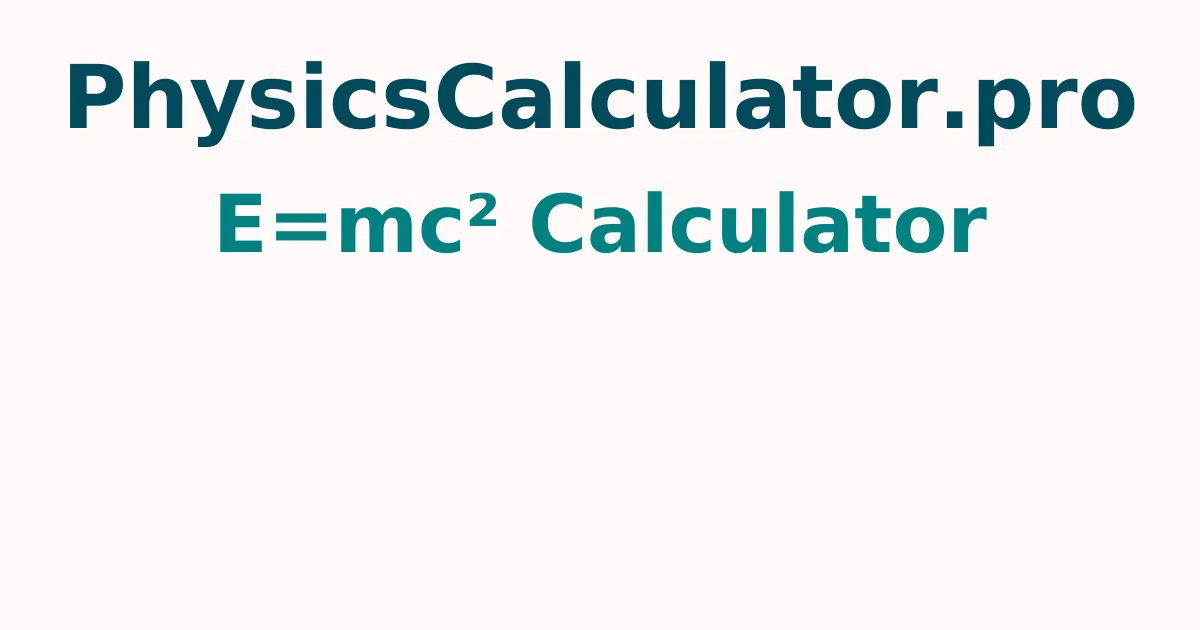E=mc² Calculator
This mass to energy calculator tool speeds up the process by displaying the mass energy equivalency value in a matter of seconds. Just type in the needed inputs mass of an object and click on the calculate button to avail the result instantly.
E=mc² Special Relativity Equation
The equivalence of mass and energy is due to Einstein's special relativity theory, which states that mass may be turned into energy and vice versa. Mass and energy are interchangeable according to this equivalency. So, if you have mass, it means you have a lot of energy stored within you. How much power do you have? This is shown below in Albert Einstein's famous relation.
According to this law, an object's mass can be converted into energy and vice versa. The conversion formula is E = mc2
- Where, E = Equivalence energy is used here(in Joules)
- m stands for mass(in kg)
- c represents the speed of light in a vacuum, which is approximately 3*108m/s.
For more concepts check out physicscalculatorpro.com to get quick answers by using this free tool.
Derivation for E = mc2 Equation
The following is the simplest way to derive Einstein's mass-energy equation:
Consider an object moving at around the speed of light.
It is being acted upon by a uniform force. Energy and momentum are induced in it as a result of the applied force.
The increase in momentum of the object= mass x velocity of the body because the force is constant.
We're noticed, Force multiplied by the distance across which the force acts equal energy gained.
E = F x c................................................ (1)
Also, The momentum gained is equal to the force multiplied by the time it takes for the force to act.
Because momentum equals mass multiplied by velocity,
The increased momentum=mxc
As a result,Force= m x c.................................. (2)
When we combine the two equations (1) and (2), we get
E = mc2
This is called equivalence of mass-energy equation.
How to use the mc2 Calculator?
The following is how to use the mass to energy calculator:
- In the input field, enter the mass and speed of light in a vacuum.
- To obtain the outcome, click the Calculate the Unknown option.
- Finally, the output field will display unknown values.
Examples on Einstein Mass Energy Calculation
Question 1:If the mass is 20 kgs then calculate the Einstein mass energy.
Solution:
Consider the problem, we have
Mass = 20.0 Gram
We know that,the formula for finding the Einstein mass energy is E=mc2
where
m is simply the mass of an object
c is the speed of light - a constant value of 299,792,458 m/s
E is the rest energy of the object
E=(20)( 299,792,458)2
Therefore, The Einstein mass energy is 1797510357473635.2 Joules
Question 2:What will be the mass of the object when the energy is 3000J.
Solution:
Consider the problem, we have
Energy=3000Joule
We know that,the formula for finding the Einstein mass energy is E=mc2
where
m is simply the mass of an object
c is the speed of light - a constant value of 299,792,458 m/s
E is the rest energy of the object
Convert Mass 3.3379501681608555x10-11 Gram into Kilo_Gram
Mass = 3.337950168160856x10-14 Kilo_Gram
Therefore,The mass of the object is 3.337950168160856x10-14 Kilo_Gram
FAQs on E=mc2 Calculator
1. What is the easiest way to convert mass to energy?
- To determine the object's mass, measure the object's mass in kg with accuracy.
- Multiply the mass by the square of the speed of light. The formula is mc2
- The total energy contained in the mass should be the consequence of this.
2. What is the equivalence of mc2 equation?
The equivalence of mass and energy is due to Einstein's special relativity theory, which states that mass may be turned into energy and vice versa. Mass and energy are interchangeable according to this equivalency.
3. What is the formula for calculating mass using the mass-energy equation?
The formula for mass energy equivalency is E=mc2. As a result, mass m = E/c2. To calculate the mass of an item, multiply the energy by the square of the speed of light.
4. Mention some of the Einstein relation-based applications.
- The energy released during nuclear reactions is calculated using binding energy measurements.
- The mass change during chemical reactions is calculated using Einstein's equation.
- The equation is used to describe the universe, its elements, and the history of planets.
